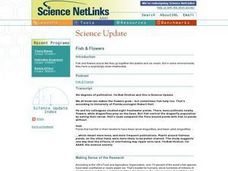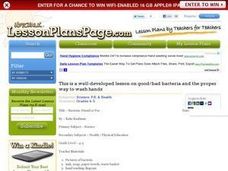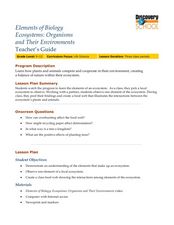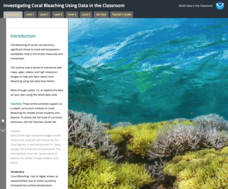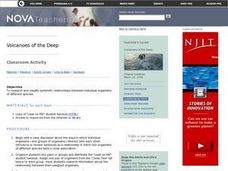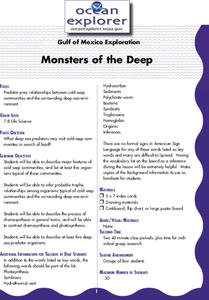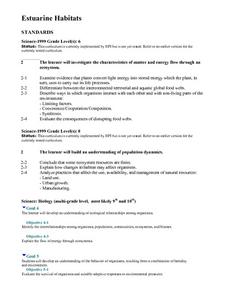Curated OER
Symbiosis: Help, Hinder or Destroy
Use background information and vocabulary to familiarize your students with the concept of symbiosis and the role agriculture plays in the shared relationship. They then write the vocabulary in their lab books or journals, and read the...
Curated OER
Biological Relationships
Create a written document to show knowledge of producers, consumers, decomposers, and symbiotic relationships. To investigate food consumption, your classes will differentiate between types of symbiosis and explain examples of each.
Alabama Learning Exchange
Make a Difference!
We are very dependent upon other life forms around us to survive. Here, scholars explore relationships in the ecosystem with the help of Auntie Litter and the pollution patrol. They imagine a world without grass, making connections to...
Pace University
Grades 6-8 Ecology
Why are our national parks important? Scholars research the national parks and explore the basic ecology of these areas in a differentiated instruction unit on ecology. They learn about ecosystems, food chains, symbiosis, and biomes. The...
Curated OER
Friend, Foe, or . . .
As a result of this lesson, upper elementary ocean explorers will be able to describe several interrelationships: symbiosis, mutualism, commensalism, and parasitism. They learn that the biological richness is increased near seamounts and...
Curated OER
Fish and Flowers
Students read and discuss a research article that explains the unlikely link between increased fish populations and increased plant pollination. They answer reading guide questions to discover this ecological relationship.
Curated OER
Bacteria: Friend or Foe?
Students examine a variety of environmental and industrial roles of bacteria. explore where bacteria can be found and distinguish bacteria from other organisms.
Curated OER
Nitrogen Fixation, OR What a Gas!
Students gain skill in the design, implementation, and reporting of a scientific research project using the scientific method. They set up an experiment to determine the effect of adding the Rhizobium bacteria to one group of legume...
Curated OER
CSI on the Deep Reef
Students read about, discuss, and research chemotrophic organisms. For this chemosynthesis lesson, students discuss the differences between photosynthesis and chemosynthesis. They learn that chemosynthesis includes a variety of chemical...
Curated OER
Organisms and Their Environments
Young scholars study a local ecosystem and research the organisms to create a food web. In this ecosystem lesson, students view a video and answer questions. They visit a local ecosystem and make a list of organisms to research. Young...
NOAA
Investigating Coral Bleaching Using Data in the Classroom
Approximately 93 percent of the individual reefs in the Great Barrier Reef suffer from coral bleaching. Scholars learn how scientists monitor coral bleaching around the world as part of a larger series. They use actual data to answer...
Curated OER
Symbiotic Strategies
Young scholars explore the different interspecies relationships namely mutualistic, commensal and parasitic. In this ecology lesson, students investigate an ecosystem disrupted by humans. They formulate an action plan to save it and...
Curated OER
Oysters Are Habit Forming!
Students examine the relationships within a salt marsh habitat. In this habitat instructional activity, students examine the various kinds of symbiotic relationships in a salt marsh habitat.
Curated OER
The Environment and Interactions of Living Organisms
Students study the environment and interactions of living organisms. They identify abiotic and biotic factors and create a foldable and vocabulary cards. They create a poster illustrating soil and watch a video to study symbiosis.
Curated OER
Volcanoes of the Deep
Students discuss how organisms relate to one another. They work together to research a specific organism and how it relates to other organisms. They present their findings to the class.
Curated OER
Design a Deep- Sea Vertebrate or Invertebrate
Students design a deep-sea animal. For this research based lesson, students research and design a vertebrate or invertebrate that lives in a methane hydrate habitat. They compile a class chart of the adaptations animals have in this...
Curated OER
Marine & Aquatic Habitats Activities - Creatures in the Coral
Students describe unique adaptations of organisms that live in the coral reef habitat, read various books pertaining to coral reefs and ocean life, and construct a wheel demonstrating the relationships between certain coral reef...
Curated OER
Animated Video Productions - Life Cycles
Seventh graders compare/contrast the life cycles of free-living organisms to that of parasites. They conduct Internet research, illustrate the stages of a specific organisms's life cycle, and direct and produce a mini-video production.
Curated OER
Monsters of the Deep
Students describe major features of cold seep communities, and list at least five organisms typical of these communities. They infer probable trophic relationships among organisms typical of cold-seep communities.
Curated OER
Coral Reef Lesson Plan Caution: Do Not Bleach!
Students explain five ways that coral reefs benefit humans and identify three threats to the reefs. They investigate the phenomenon of "coral bleaching" while examining ways to reduce threats to coral reefs.
Curated OER
Choose Your Defense: Spines, Vomit and Camouflage
Young scholars investigate defensive mechanisms of insects and organisms. In this biology lesson, students draw imaginary caterpillars as well as imaginary parasites that will harm the caterpillar. Young scholars utilize the Internet...
Curated OER
A Reef of Your Own
Students research and study the life and reproductive strategies of reef building corals. They examine how coral reefs can produce high levels of biological material when they are surviving in areas of low nutrition.
Curated OER
Living With the Heat: The Ring of Fire
Students investigate the planet Earth's infamous ring of fire and the life that thrives from it. For this ocean environment lesson, students investigate hydrothermal vents and how organisms thrive off their heat. Students complete a...
Curated OER
Estuarine Habitats
Sixth graders study the important habitats, flora, fauna, and physical factors of coastal habitats. They compare the aquatic habitats to terrestrial habitats by researching and completing tables with the information.







